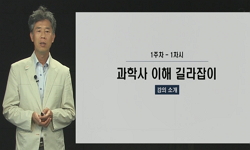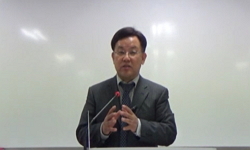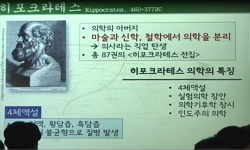이 연구는 진화 개념의 발달 단계가 전공과 국가에 따라서 유의미한 차이가 있는지 확인하기 위하여 진행되었다. 이 연구를 위하여 한국과 미국의 대학생의 자료를 생물 전공과 비생물 전공...
http://chineseinput.net/에서 pinyin(병음)방식으로 중국어를 변환할 수 있습니다.
변환된 중국어를 복사하여 사용하시면 됩니다.
- 中文 을 입력하시려면 zhongwen을 입력하시고 space를누르시면됩니다.
- 北京 을 입력하시려면 beijing을 입력하시고 space를 누르시면 됩니다.

진화개념의 역사에 근거한 한국과 미국 대학생의 진화개념 수준 비교 = A Comparison between Korean and American College Students' Evolution Concepts based on the History of Evolutionary Ideas
한글로보기https://www.riss.kr/link?id=A103629425
- 저자
- 발행기관
- 학술지명
- 권호사항
-
발행연도
2017
-
작성언어
Korean
- 주제어
-
등재정보
KCI등재
-
자료형태
학술저널
- 발행기관 URL
-
수록면
659-668(10쪽)
-
KCI 피인용횟수
1
- DOI식별코드
- 제공처
- 소장기관
-
0
상세조회 -
0
다운로드
부가정보
국문 초록 (Abstract)
이 연구는 진화 개념의 발달 단계가 전공과 국가에 따라서 유의미한 차이가 있는지 확인하기 위하여 진행되었다. 이 연구를 위하여 한국과 미국의 대학생의 자료를 생물 전공과 비생물 전공에 따라 구분하여 수집하였다. Ha(2007)이 개발한 도구를 사용하여 Ha(2016)의 분석방법에 근거하여 순위선다형으로 분석하였다. 연구 결과 진화적 사고의 과학사적 발달 과정(창조, 목적, 의도, 용불용설, 자연선택)을 토대로 순위선다방식으로 분석하는 방법이 한국과 미국, 전공과 비전공 학생에게도 적합하게 적용될 수 있는 방법임이 확인되었다. 진화 개념의 발달 단계를 확인한 결과 우리나라 대학생들은 용불용설 수준, 미국의 대학생들은 목적론적 설명 수준에 있는 것으로 확인되었다. 전공과 국가에 따른 진화 개념의 발달 수준은 진화 설명소재와 교호작용효과가 있는지 확인한 결과 유의미한 교호작용효과가 없는 것으로 확인되었다. 진화 개념의 발달 단계와 종교성은 유의미한 관련성이 있었다. 이 연구 결과들을 토대로 진화 개념의 발달 특성에 대해서 논의한다.
다국어 초록 (Multilingual Abstract)
This study was conducted to identify whether there is a significant difference in the developmental stages of the evolution concept depending on the major and the country. For this study, college students (both biology major and non-biology major) in ...
This study was conducted to identify whether there is a significant difference in the developmental stages of the evolution concept depending on the major and the country. For this study, college students (both biology major and non-biology major) in Korea and the United States answered evolution concept assessment developed by Ha (2007). The data were analyzed based on the method of developed by Ha (2016). As a result of this study, Cronbach alpha for internal consistency reliability and MNSQ indices for item response fitness of the ordered multiple choice method providing 0 to 4 point scores to creationism, teleology, intentionality, use/disuse, and natural selection respectively, satisfied the benchmark. The level of Korean college students' evolution concepts was located in use/disuse and the level of USA college students' evolution concepts was located in teleology. No interaction effect was found between the difference of conceptual progressions of evolution concept by major and country and evolution contexts (human, animal, and plant). There was a significant relationship between developmental stages of evolution concept and their religiosity. Based on the results of this study, we discuss developmental characteristics of evolutionary concepts.
참고문헌 (Reference)
1 하민수, "한국과 미국 대학생들의 종교성, 진화 흥미, 진화 개념, 진화 수용의 수준과 구조 비교" 한국과학교육학회 32 (32): 1537-1550, 2012
2 하민수, "진화 기작에 관한 설명의 질적 횡단 연구" 한국생물교육학회 35 (35): 106-116, 2007
3 하민수, "예비생물교사와 현직생물교사의 진화 개념 비교 분석" 한국생물교육학회 44 (44): 277-288, 2016
4 하민수, "설명대상에 따른 학생들의 진화 개념과 진화 개념 형성의 특성에 관한 횡단적 연구" 한국과학교육학회 26 (26): 813-825, 2006
5 이순남, "비진화단원 수업에 포함된 생물 교사들의 진화적 설명의 인식 과정에 관한 질적 사례 연구" 한국생물교육학회 42 (42): 450-466, 2014
6 하민수, "과학사에 근거한 진화개념검사도구의 타당도 확인 및 맥락에 따른 진화개념 발달 탐색" 한국과학교육학회 36 (36): 509-517, 2016
7 Heywood, B. T., "“Meant to be”: how religious beliefs and cultural religiosity affect the implicit bias to think teleologically" 4 (4): 183-201, 2014
8 Inagaki, K., "Young Children’s Naive Thinking about the Biological World" Psychology Press 2002
9 Kanazawa, S., "Why liberals and atheists are more intelligent" 73 (73): 33-57, 2010
10 Banerjee, K., "Why did this happen to me? Religious believers’ and non-believers’ teleological reasoning about life events" 133 (133): 277-303, 2014
1 하민수, "한국과 미국 대학생들의 종교성, 진화 흥미, 진화 개념, 진화 수용의 수준과 구조 비교" 한국과학교육학회 32 (32): 1537-1550, 2012
2 하민수, "진화 기작에 관한 설명의 질적 횡단 연구" 한국생물교육학회 35 (35): 106-116, 2007
3 하민수, "예비생물교사와 현직생물교사의 진화 개념 비교 분석" 한국생물교육학회 44 (44): 277-288, 2016
4 하민수, "설명대상에 따른 학생들의 진화 개념과 진화 개념 형성의 특성에 관한 횡단적 연구" 한국과학교육학회 26 (26): 813-825, 2006
5 이순남, "비진화단원 수업에 포함된 생물 교사들의 진화적 설명의 인식 과정에 관한 질적 사례 연구" 한국생물교육학회 42 (42): 450-466, 2014
6 하민수, "과학사에 근거한 진화개념검사도구의 타당도 확인 및 맥락에 따른 진화개념 발달 탐색" 한국과학교육학회 36 (36): 509-517, 2016
7 Heywood, B. T., "“Meant to be”: how religious beliefs and cultural religiosity affect the implicit bias to think teleologically" 4 (4): 183-201, 2014
8 Inagaki, K., "Young Children’s Naive Thinking about the Biological World" Psychology Press 2002
9 Kanazawa, S., "Why liberals and atheists are more intelligent" 73 (73): 33-57, 2010
10 Banerjee, K., "Why did this happen to me? Religious believers’ and non-believers’ teleological reasoning about life events" 133 (133): 277-303, 2014
11 Heddy, B. C., "Variables associated to public acceptance of evolution in the United States" 6 (6): 1-14, 2013
12 Messick, S., "Validity of psychological assessment : Validation of inferences from persons’ responses and performances as scientific inquiry into score meaning" 50 (50): 741-749, 1995
13 Pesta, B. J., "Toward an index of well-being for the fifty US states" 38 (38): 160-168, 2010
14 Zuckerman, M., "The relation between intelligence and religiosity : A meta-analysis and some proposed explanations" 17 (17): 325-354, 2013
15 Lombrozo, T., "The importance of understanding the nature of science for accepting evolution" 1 (1): 290-298, 2008
16 Kirsh, D., "The Cambridge Handbook of Situated Cognition" Cambridge University Press 2009
17 Kampourakis, K., "Students’ preconceptions about evolution: How accurate is the characterization as “Lamarckian” when considering the history of evolutionary thought?" 16 (16): 393-422, 2007
18 Kampourakis, K., "Students’ intuitive explanations of the causes of homologies and adaptations" 17 (17): 27-47, 2008
19 Dagher, Z. R., "Scientific views and religious beliefs of college students : The case of biological evolution" 34 (34): 429-445, 1997
20 Fysh, R., "Religious beliefs in science classrooms" 28 (28): 399-427, 1998
21 Sherkat, D. E., "Religion and scientific literacy in the United States" 92 (92): 1134-1150, 2011
22 Wright, B. D., "Reasonable mean-square-fit values" 8 (8): 370-, 1994
23 Boone, W. J., "Rasch Analysis in The Human Sciences" Springer 2014
24 Kelemen, D., "Professional physical scientists display tenacious teleological tendencies : Purpose-based reasoning as a cognitive default" 142 (142): 1074-, 2013
25 Brumby, M. N., "Misconceptions about the concept of natural selection by medical biology students" 68 (68): 493-503, 1984
26 Nehm, R. H., "Item feature effects in evolution assessment" 48 (48): 237-256, 2011
27 Kelemen, D., "Intuitions about origins : Purpose and intelligent design in children’s reasoning about nature" 6 (6): 3-31, 2005
28 Sinatra, G. M., "Intentions and beliefs in students’ understanding and acceptance of biological evolution" 40 : 510-528, 2003
29 Razmyar, S., "Individual differences in religiosity as a function of cognitive ability and cognitive style" 41 (41): 667-673, 2013
30 Trani, R., "I won’t teach evolution; it’s against my religion. And now for the rest of the story…" 66 (66): 419-427, 2004
31 Newell, A., "Human Problem Solving (Vol. 104, No. 9)" Prentice-Hall 1972
32 Heredia, S. C., "Exploring the influence of plant and animal item contexts on student response patterns to natural selection multiple choice items" 9 (9): 1-10, 2016
33 Rutledge, M. L., "Evolutionary theory, the nature of science & high school biology teachers : Critical relationships" 62 (62): 23-31, 2000
34 Bowler, P. J., "Evolution: The history of an idea" University of California Press 2009
35 Downie, J. R., "Evolution and religion : attitudes of Scottish first year biology and medical students to the teaching of evolutionary biology" 34 (34): 139-146, 2000
36 Nehm, R. H., "Does increasing biology teacher knowledge of evolution and the nature of science lead to greater preference for the teaching of evolution in schools?" 18 (18): 699-723, 2007
37 Ha, M., "Development of the instructional strategies of evolution based on the cross-sectional analysis of evolution conception" Korean National University of Education 2007
38 Ha, M., "Darwin’s difficulties and students’ struggles with trait loss : cognitive-historical parallelisms in evolutionary explanation" 23 (23): 1051-1074, 2014
39 Hodgson, G. M., "Darwinism, causality and the social sciences" 11 (11): 175-194, 2004
40 Choi, I., "Culture and judgement of causal relevance" 84 (84): 46-59, 2003
41 Hergovich, A., "Critical thinking ability and belief in the paranormal" 38 (38): 1805-1812, 2005
42 Settlage Jr, J., "Conceptions of natural selection : a snapshot of the sense-making process" 31 (31): 449-457, 1994
43 Meir, E., "College students’misconceptions about evolutionary trees" 69 (69): 71-76, 2007
44 Opfer, J. E., "Cognitive foundations for science assessment design : knowing what students know about evolution" 49 (49): 744-777, 2012
45 Willard, A. K., "Cognitive biases explain religious belief, paranormal belief, and belief in life’s purpose" 129 (129): 379-391, 2013
46 Colburn, A., "Clergy views on evolution, creationism, science, and religion" 43 (43): 419-442, 2006
47 Bartsch, K., "Children talk about the mind" Oxford University Press 1995
48 Sinatra, G. M., "Changing minds? Implications of conceptual change for teaching and learning about biological evolution" 1 (1): 189-195, 2008
49 Gotthelf, A., "Aristotle’s conception of final causality" 30 : 226-254, 1976
50 Nehm, R. H., "Academic preparation in biology and advocacy for teaching evolution : biology versus nonbiology teachers" 93 (93): 1122-1146, 2009
51 Kim, S. Y., "A cross-cultural comparison of Korean and American science teachers’ views of evolution and the nature of science" 33 (33): 197-227, 2011
동일학술지(권/호) 다른 논문
-
교육과정 변화에 따른 우리나라 초등학교 4학년 학생들의 TIMSS 과학 내용영역별 성취 특성 분석
- 한국과학교육학회
- 곽영순
- 2017
- KCI등재
-
과학기술의 사회적 쟁점에서 시민 참여에 대한 대학생들의 인식과 실천 역량에 대한 분석
- 한국과학교육학회
- 이영희
- 2017
- KCI등재
-
- 한국과학교육학회
- 손정우
- 2017
- KCI등재
-
- 한국과학교육학회
- 임인숙
- 2017
- KCI등재
분석정보
인용정보 인용지수 설명보기
학술지 이력
| 연월일 | 이력구분 | 이력상세 | 등재구분 |
|---|---|---|---|
| 2027 | 평가예정 | 재인증평가 신청대상 (재인증) | |
| 2021-01-01 | 평가 | 등재학술지 유지 (재인증) |  |
| 2018-03-29 | 학술지명변경 | 외국어명 : Journal of the Korean Association for in Science Education -> Journal of the Korean Association for Science Education |  |
| 2018-01-01 | 평가 | 등재학술지 유지 (등재유지) |  |
| 2015-01-01 | 평가 | 등재학술지 유지 (등재유지) |  |
| 2011-01-01 | 평가 | 등재학술지 유지 (등재유지) |  |
| 2009-01-01 | 평가 | 등재학술지 유지 (등재유지) |  |
| 2007-04-26 | 학술지명변경 | 외국어명 : Journal of the Korean Association for Research in Science Education -> Journal of the Korean Association for in Science Education |  |
| 2007-04-03 | 학회명변경 | 영문명 : The Korean Association For Research In Science Education -> The Korean Association for Science Education |  |
| 2007-01-01 | 평가 | 등재학술지 유지 (등재유지) |  |
| 2005-01-01 | 평가 | 등재학술지 유지 (등재유지) |  |
| 2002-01-01 | 평가 | 등재학술지 선정 (등재후보2차) |  |
| 1999-07-01 | 평가 | 등재후보학술지 선정 (신규평가) |  |
학술지 인용정보
| 기준연도 | WOS-KCI 통합IF(2년) | KCIF(2년) | KCIF(3년) |
|---|---|---|---|
| 2016 | 1.87 | 1.87 | 1.69 |
| KCIF(4년) | KCIF(5년) | 중심성지수(3년) | 즉시성지수 |
| 1.66 | 1.54 | 2.133 | 0.47 |





 ScienceON
ScienceON KISS
KISS







